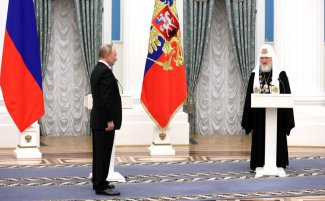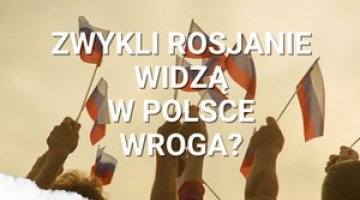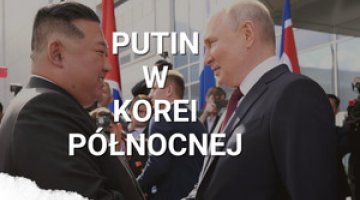A holy war. The Russian Orthodox Church blesses the war against the West

Representatives of the Russian Orthodox Church (ROC) have supported the war and justified Russia’s aggressive policy since the beginning of the invasion of Ukraine. There have been very few voices criticising the invasion among the clergy, and any such instances of criticism have been consistently suppressed due to censorship within the church and the state. Over the past few weeks, the ROC’s position has become even more unequivocal and radical. On 27 March, the World Russian People’s Council (Всемирный Русский Народный Собор), an organisation associated with the ROC and chaired by Patriarch Kirill, published a policy paper in which the war in Ukraine was called a “holy war”. The document identified the “West immersed in Satanism” as the main enemy of Russia and the Russian people and one which poses a threat not only to them but also to the entire Russian civilisation and Christian religion, from which it (the West) has turned away.
At home, the paper aims to increase the mobilisation of the Russian public and elites, which can be used by the regime to maintain support for the war. The religious motives behind the war are emphasised as a statement of Russia’s strong determination to continue the invasion and subjugation of Ukraine. The content of the decree also fits in with the increasingly harsh rhetoric employed towards the West by the country’s most senior officials, including Vladimir Putin. The ROC not only accepts and justifies the conflict post factum but has also adopted a proactive stance, providing the authorities with a sacred and messianic justification for the war. The church thus supports the aggressive and expansionist state ideology based on the ideas promoted by the church itself: Holy Rus, the Russian World and the All-Russian nation. The aim of this rhetoric is also to exert psychological pressure on Western elites. Nor can it be ruled out that this is also part of preparations for more aggressive moves against the West.
War against the West as a ‘holy war’
Since the outset of the invasion of Ukraine, hierarchs of the Russian Orthodox Church have sanctioned and justified the war. After over two years, the church’s support for the invasion has moved to another level. On 27 March, the World Russian People’s Council (hereinafter: the Council) published a policy paper entitled ‘Decree of the 25th World Russian People’s Council: the present and the future of the Russian World’. In this document, the conflict with Ukraine was depicted as a “holy war”, where Russia is on the side of “good” and the West embodies “evil”. It is noteworthy that it was not Kyiv but explicitly the West that was identified as the main adversary, which was alleged to have renounced Christianity and embraced Satanism.
According to the document, Russia and its people are defending the “sole spiritual space of Holy Rus”, and are thus fulfilling God’s mandate. The document stipulates that, once the “operation” is over, the entire territory of Ukraine should fall within Moscow’s exclusive sphere of influence, and there should be no room for any “Russophobic political regime” there. The wording of the document concerning the conquest of these territories suggests that, even though the signatories of the decree, just like the Kremlin, accept that a Ukrainian state may exist in some form, they believe that it should be a puppet regime, governed by Moscow-friendly elites who are totally subservient to Russia.
The Council brings together not only high-ranking church hierarchs but also politicians, officials, public figures and pro-regime oligarchs with nationalist leanings. It is chaired by the head of the ROC, Patriarch Kirill, and its extensive presidium includes figures such as the governor of Saint Petersburg, Alexander Beglov, the presiding judge of the Constitutional Court, Valery Zorkin and the Minister of Internal Affairs, Vladimir Kolokoltsev. While the organisation predominantly comprises Russian activists, it utilises its official status of an international organisation for propaganda purposes and assert the right to speak on behalf of all communities where Russian Orthodoxy is present. Traditionally, the Church perceives this space as the ‘Russian World’, a civilisational community where the ROC and the Kremlin, as its most important religious and political powers, should predominate.[1] At the core of this space lies the territory of historical Holy Rus, which the ROC believes to be the cradle of Russian Orthodoxy and an area that, historically, should fall under Moscow’s jurisdiction, both ecclesiastical and political. The church claims that at present, these territories are divided by enemies and are striving for reunification.
The religious foundations of the expansionist state ideology
The views expressed in the decree reflect the stance of the entire Russian Orthodox Church. Both the ROC and the Council are controlled by Patriarch Kirill, who governs the church in an authoritarian manner in excess of the powers that are typically vested in the patriarch. The vision of war as a clash of good versus evil had been present in fragmented form in church hierarchs’ statements. However, this is the first time it has been comprehensively articulated in an official document. In the past, Kirill proclaimed during one of his sermons, for example, that death on the battlefield in Ukraine washes away all sins and that Russia opposes the Antichrist and global evil. Similar claims have been made by experts close to the church. Moreover, after the invasion commenced, the patriarch ordered that the Prayer for Holy Rus for victory in the war should be mandatory in all church services. In this prayer the war is presented as a fight for the survival of the so-called All-Russian nation.
This vision aligns with the narrative and goals of the ‘special military operation’ promoted by the Kremlin, where the invasion is portrayed as a defensive, just and existential war which is taking place in Ukraine against the much stronger perennial enemy: the West. However, the content of the decree goes beyond the previous framework of the church’s cooperation with the government, which involved accepting and justifying the invasion. The document provides a comprehensive ideological, moral and religious justification for continuing the war, which is now presented as a strictly religious and messianic fight. The church thus creates the foundations for an aggressive and expansionist state ideology from which the Kremlin can draw, based on the ideas the church has promoted for a long time: Holy Rus, the Russian World and the united All-Russian nation.
The goals of the church’s claims
In domestic politics, the decree and the church’s position expressed therein are intended to increase the engagement of the Russian public and elites in the war, which the regime will be able to directly exploit in its military campaign in Ukraine. Considering the strong institutional ties between the ROC and the Kremlin, it may be assumed that this stance was somehow coordinated with the central government. The ‘holy war’ slogans may be used to mentally prepare Russians for increased mobilisation or to justify other unpopular war-related decisions.
Furthermore, the content of the document fits in with the increasingly harsh rhetoric adopted by the country’s most important figures, including Putin, towards the West, especially the US. This rhetoric has recently been seen, for example, in politicians’ statements concerning the terrorist attack staged near Moscow on 22 March,[2] which the Kremlin blamed on Western intelligence services. The purpose of this message is primarily to put psychological pressure on the West and compel it to stop helping Kyiv. The war is framed in religious terms in order to underscore Russia’s determination to win and its unwavering commitment to the goals of the so-called ‘special operation’. It cannot be ruled out that the rhetoric is being escalated in order to prepare the public for more aggressive moves against the West, which is consistently portrayed as the primary source of ‘evil’ and is dehumanised in the Russian political and propaganda discourse. Similar social engineering mechanisms were employed ahead of the invasion of Ukraine in 2022.
The involvement of the ROC in promoting the invasion confirms that the Russian Orthodox Church is not only an integral part of the Russian political establishment but also a significant instrument in Russia’s hybrid (including propaganda) war against the West. Its role is to influence communities of believers both within and outside Russia, by leveraging its status and, more importantly, the communication channels typical of a religious organisation.
The ROC’s engagement in the war
The Russian Orthodox Church’s support for the war extends beyond mere rhetoric. Its individual priests and entire structures participate in promoting the military campaign, fundraising and sending humanitarian aid to combatants or aiding veterans. Some priests publicly bless military equipment and soldiers heading to the front lines. The Synodal Department for Cooperation with the Armed Forces uses its Telegram account to run a pro-war propaganda campaign, reporting on the situation on the front lines and the activities of priests there. Church media outlets do a lot to publicise these efforts in order to demonstrate that the war is a righteous cause supported by the ROC and its followers.
However, sometimes propaganda materials do prove controversial among the Russian public, especially within its more liberal segments. One example of this was the appearance by the priest Mikhail Vasilyev on the Orthodox channel television Spas, where he urged Russian women to have more children, as they would then not regret sending their sons to the front lines. Shortly after this Vasilyev himself was killed in Ukraine in November 2022, where, as stated on the official website of the Patriarchate, he had gone “on a pastoral mission”.
Meanwhile, complete censorship has been implemented within the Church, and those representatives of the clergy who are critical of the war or fail to comply with the patriarch’s orders are severely punished. At least several priests have been disciplinarily defrocked (banned from ministry and deprived of income) for refusing to recite the Prayer for Holy Rus during religious service or for modifying it, thus disobeying Kirill’s orders. Two prominent cases include the defrocking of highly respected priests: Alexei Uminsky (parish priest of the Holy Trinity Church at Khokhly in Moscow) and Ioann Koval (who allegedly replaced the word ‘victory’ with ‘peace’ in the prayer); both priests subsequently came under the jurisdiction of the Patriarchate of Constantinople. In turn, Andrey Kordochkin left the Moscow Patriarchate – specifically its Spanish-Portuguese diocese – on his own initiative to protest against the invasion and the ROC’s support for it. After resigning, he initiated the Peace to All (Мир всем) project to assist priests persecuted by the church for their anti-war stance.
Examples of the Russian Orthodox Church’s subordination to the Kremlin
The Russian Orthodox Church’s policy in Russia has clearly favoured the Kremlin over the past years. Besides justifying the war, it consistently promoted the regime’s policies both at home and abroad. Patriarch Kirill has lent his support to the Kremlin by participating in governmental ceremonies, such as during the celebrations of the annexation of the territories separated from Ukraine. In July 2022, the Holy Synod of the Russian Orthodox Church (Священный синод Русской православной церкви) decided to remove Crimea from the jurisdiction of the Ukrainian Orthodox Church of the Moscow Patriarchate and directly subordinate it to the Russian Church,[3] a move initially avoided directly after the annexation to prevent the alienation of believers in Ukraine. In 2024, a bishop who is believed to be Putin’s confessor and who is known for his pro-Kremlin views as well as for his extensive involvement in propaganda justifying Russia’s historical claims to Crimea and the invasion, Tikhon (Georgy Shevkunov), was appointed Metropolitan of Simferopol and Crimea.[4]
In internal politics, the church, for example, has opposed the introduction of laws criminalising domestic violence, claiming that they are inconsistent with “traditional and Orthodox values”. Additionally, in its documents (including the aforementioned decree), the ROC has promoted increasing the birth rate and backed nationalist attitudes, for example, advocating for a more restrictive approach to migration. Church structures have also facilitated the state’s repressive policies. For example, recently, they made difficulties for the holding of Alexei Navalny’s funeral. Ultimately, despite numerous problems, he was buried in Moscow on 1 March, and the religious ceremony was limited to the necessary minimum.
Prominent as the church and the patriarch himself are in Russian public life, the ROC has been losing social and religious significance. Russians are not a very religious people, and their declared affiliation with Orthodoxy mainly revolves around participation in holiday rituals rather than actual faith or respect for Christian values. Various surveys have revealed that in recent years, the percentage of citizens considering themselves religious has declined despite the government’s visible efforts to promote the church and ‘traditional values’. In May 2023, around 60% of Russians claimed that religion did not play a significant role in their lives.[5] The level of participation in church practices is also minimal – only 12% of respondents go to church at least once a month. At the same time, 72% of respondents identify as Orthodox – they view religion more as an element of national and cultural identity or even as an area of social ritualism. Meanwhile, interest in esotericism and the paranormal is growing (for example, tarot card sales are breaking records), and there is an increase in crime, divorce rates and the widespread use of alcohol and all kinds of drugs.
Consequences of the church’s stance
Russians are not overly religious, so the potential for the church’s views to translate into societal impact and effectively increase mobilisation in this manner is certainly constrained. However, the Russian Orthodox Church’s stance is used more broadly as part of the government’s propaganda, which is simultaneously adopting an increasingly aggressive and absurd tone, one example of which is accusing the West of Satanism. These views may garner moderate approval within Russia itself.
In the international community, the ROC’s ostentatious support for the Kremlin’s aggressive policies backed by such radical arguments, may be counterproductive – contributing to further discreditation of both the church and its leader. As a result, the church’s communication channels, effectively exploited by the government – such as influencing Orthodox communities outside Russia, individuals disillusioned with the West or supporters of moral conservatism – may become less effective.
In the long term, the church’s war rhetoric will likely lead to a more adequate assessment of this institution in the international community. The Russian Orthodox Church maintains active contacts with the international religious organisations in the West it is so critical about – such as the World Council of Churches or the Holy See. Moscow has so far used the church’s links with their structures to promote pacifist views, effectively referring to ending the war in Ukraine on Russian terms (essentially misinforming the international community about its own intentions), and to propagate anti-Western, especially anti-American, sentiments among those who already have a negative assessment of the actions and morality of Western elites. The content of the Decree of the 25th World Russian People's Council: the present and the future of the Russian world, in which the West was unequivocally named as the main enemy and branded as satanic, reveals the actual worldview of the ROC representing, like the Kremlin, a zero-sum approach, which is focused on confrontation and aggressive expansion rather than cooperation for the sake of peace.
[1] Both the church and the Kremlin assume that the primary target of their influence are the Eastern Slavs: Russians, Ukrainians and Belarusians, as well as all Russian-speaking and Orthodox communities.
[2] For more, see M. Menkiszak, P. Żochowski, ‘Islamists and the ‘Ukrainian trace’. The Moscow concert hall terrorist attack’, OSW, 23 March 2024, osw.waw.pl.
[3] In the form of the newly established Crimean Metropolis, comprising the dioceses of Simferopol, Crimea, Dzhankoi and Feodosia.
[4] Tikhon has presented his views, for example, in the interview for the celebrity and former opposition activist Ksenia Sobchak in her show Осторожно: Собчак, see Тихон Шевкунов: о России, церкви и войне, 15 May 2023, youtube.com.
[5] Levada Center Survey Religious beliefs, 2 June 2023, levada.ru.




